Comprehensive Report on Support Work in Social Care Settings
VerifiedAdded on 2020/07/23
|6
|1502
|28
Report
AI Summary
This report delves into the multifaceted world of support work within social care environments, focusing on the crucial roles of non-direct workers. It meticulously outlines their responsibilities, emphasizing the significance of interpersonal skills in effective communication and collaboration. The report further examines the dynamics of team operations, highlighting how non-direct workers contribute to maintaining health, safety, and security within care settings. Additionally, it underscores the importance of supervision and management in fostering the development of non-direct workers, ensuring the provision of quality care. The report references various academic sources to support its findings, offering a comprehensive analysis of the topic.
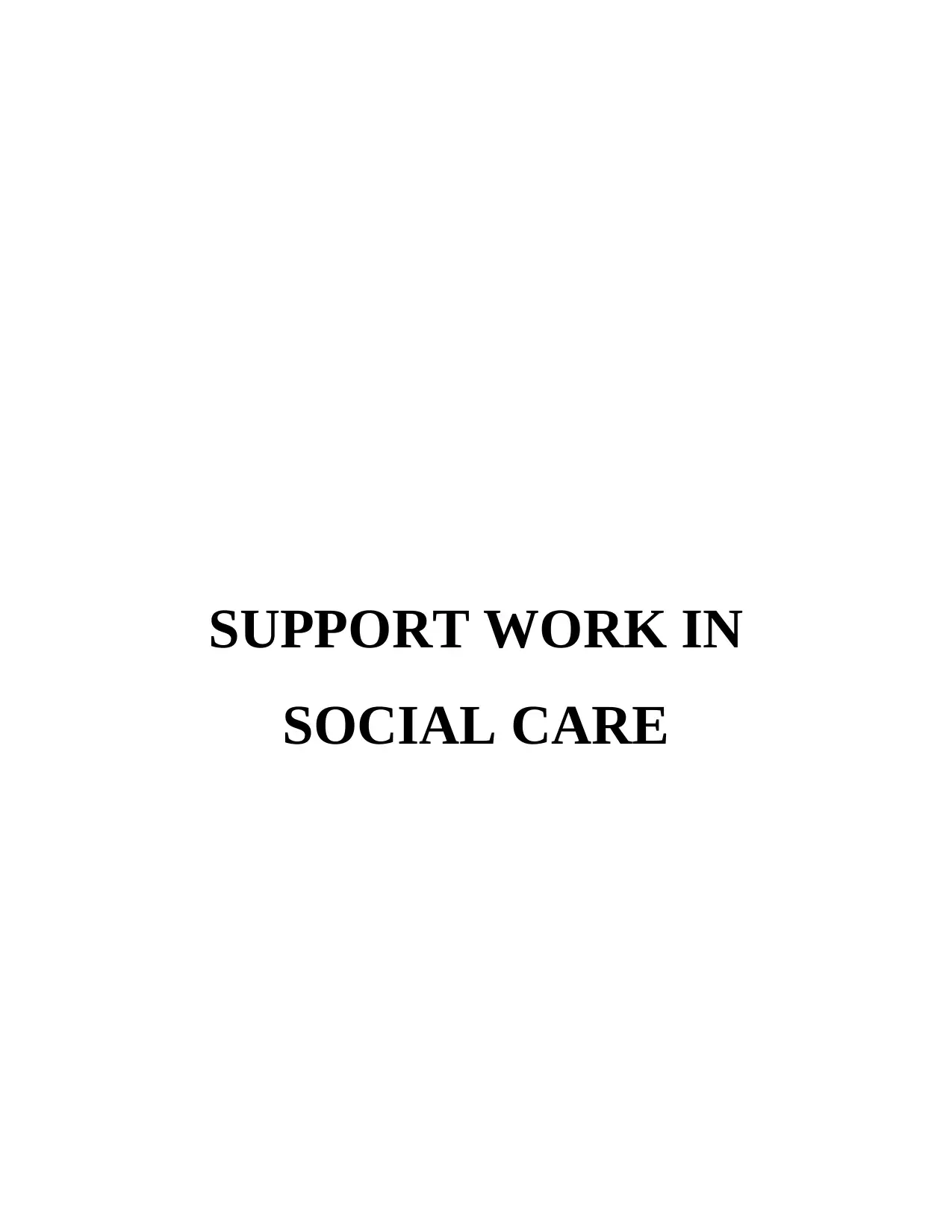
SUPPORT WORK IN
SOCIAL CARE
SOCIAL CARE
Paraphrase This Document
Need a fresh take? Get an instant paraphrase of this document with our AI Paraphraser
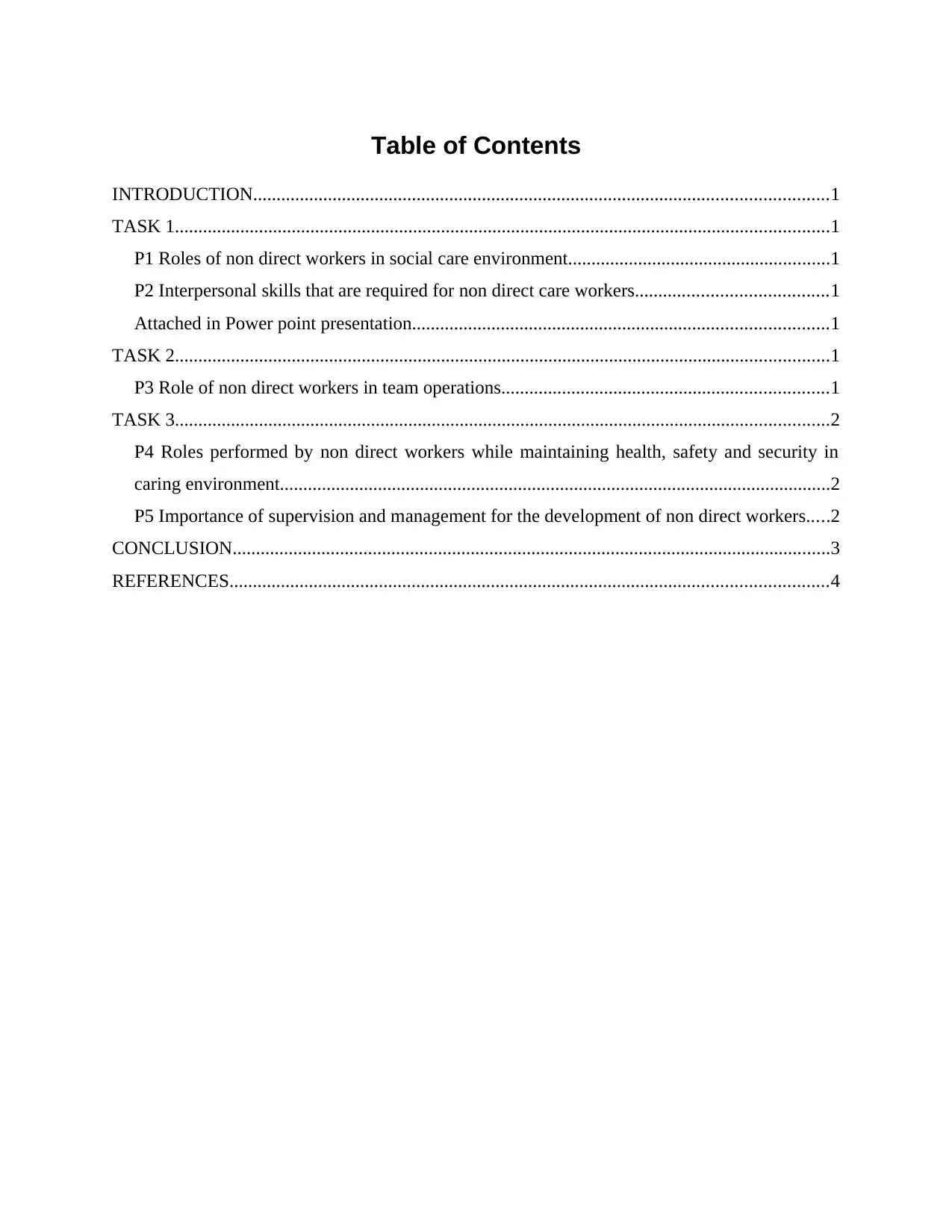
Table of Contents
INTRODUCTION...........................................................................................................................1
TASK 1............................................................................................................................................1
P1 Roles of non direct workers in social care environment........................................................1
P2 Interpersonal skills that are required for non direct care workers.........................................1
Attached in Power point presentation.........................................................................................1
TASK 2............................................................................................................................................1
P3 Role of non direct workers in team operations......................................................................1
TASK 3............................................................................................................................................2
P4 Roles performed by non direct workers while maintaining health, safety and security in
caring environment......................................................................................................................2
P5 Importance of supervision and management for the development of non direct workers.....2
CONCLUSION................................................................................................................................3
REFERENCES................................................................................................................................4
INTRODUCTION...........................................................................................................................1
TASK 1............................................................................................................................................1
P1 Roles of non direct workers in social care environment........................................................1
P2 Interpersonal skills that are required for non direct care workers.........................................1
Attached in Power point presentation.........................................................................................1
TASK 2............................................................................................................................................1
P3 Role of non direct workers in team operations......................................................................1
TASK 3............................................................................................................................................2
P4 Roles performed by non direct workers while maintaining health, safety and security in
caring environment......................................................................................................................2
P5 Importance of supervision and management for the development of non direct workers.....2
CONCLUSION................................................................................................................................3
REFERENCES................................................................................................................................4
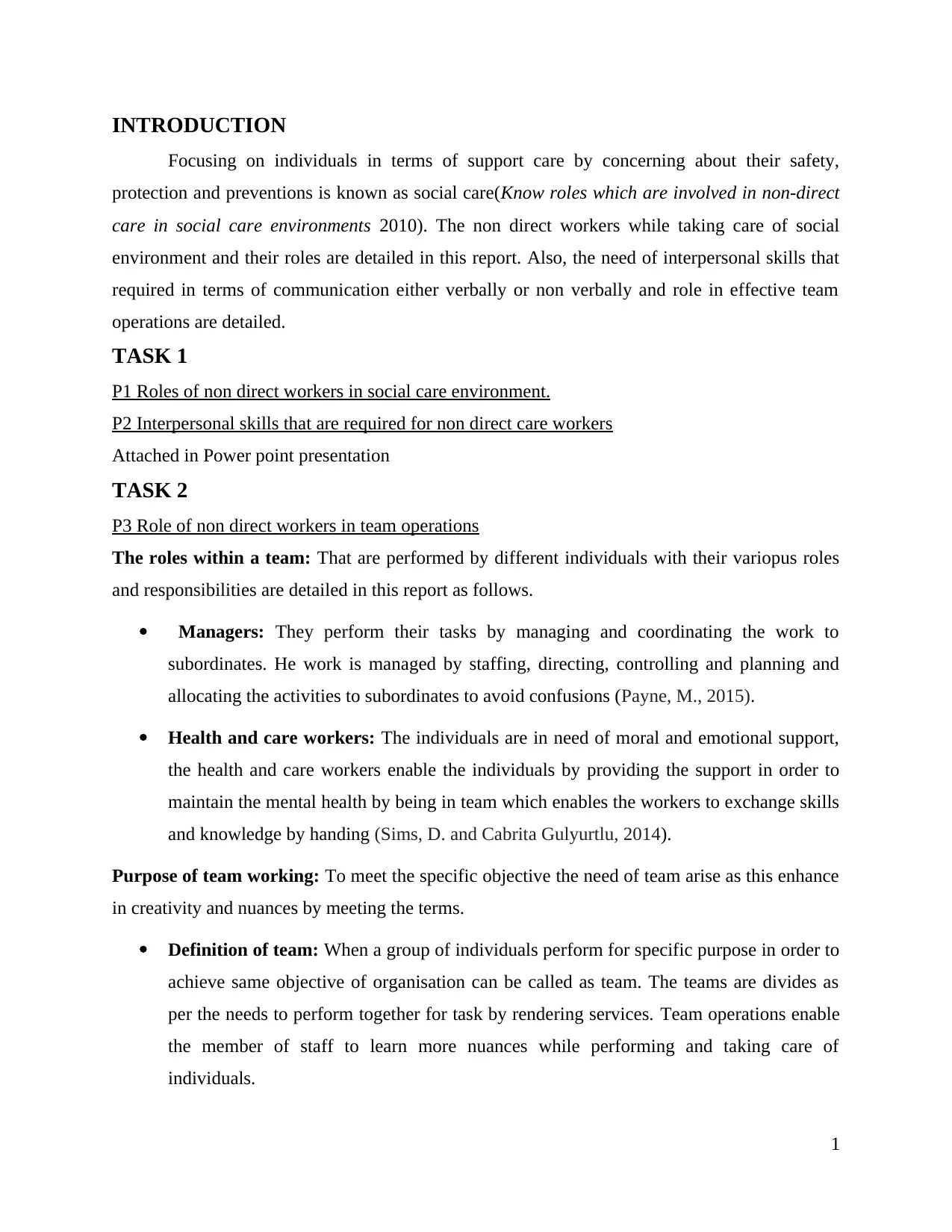
INTRODUCTION
Focusing on individuals in terms of support care by concerning about their safety,
protection and preventions is known as social care(Know roles which are involved in non-direct
care in social care environments 2010). The non direct workers while taking care of social
environment and their roles are detailed in this report. Also, the need of interpersonal skills that
required in terms of communication either verbally or non verbally and role in effective team
operations are detailed.
TASK 1
P1 Roles of non direct workers in social care environment.
P2 Interpersonal skills that are required for non direct care workers
Attached in Power point presentation
TASK 2
P3 Role of non direct workers in team operations
The roles within a team: That are performed by different individuals with their variopus roles
and responsibilities are detailed in this report as follows.
Managers: They perform their tasks by managing and coordinating the work to
subordinates. He work is managed by staffing, directing, controlling and planning and
allocating the activities to subordinates to avoid confusions (Payne, M., 2015).
Health and care workers: The individuals are in need of moral and emotional support,
the health and care workers enable the individuals by providing the support in order to
maintain the mental health by being in team which enables the workers to exchange skills
and knowledge by handing (Sims, D. and Cabrita Gulyurtlu, 2014).
Purpose of team working: To meet the specific objective the need of team arise as this enhance
in creativity and nuances by meeting the terms.
Definition of team: When a group of individuals perform for specific purpose in order to
achieve same objective of organisation can be called as team. The teams are divides as
per the needs to perform together for task by rendering services. Team operations enable
the member of staff to learn more nuances while performing and taking care of
individuals.
1
Focusing on individuals in terms of support care by concerning about their safety,
protection and preventions is known as social care(Know roles which are involved in non-direct
care in social care environments 2010). The non direct workers while taking care of social
environment and their roles are detailed in this report. Also, the need of interpersonal skills that
required in terms of communication either verbally or non verbally and role in effective team
operations are detailed.
TASK 1
P1 Roles of non direct workers in social care environment.
P2 Interpersonal skills that are required for non direct care workers
Attached in Power point presentation
TASK 2
P3 Role of non direct workers in team operations
The roles within a team: That are performed by different individuals with their variopus roles
and responsibilities are detailed in this report as follows.
Managers: They perform their tasks by managing and coordinating the work to
subordinates. He work is managed by staffing, directing, controlling and planning and
allocating the activities to subordinates to avoid confusions (Payne, M., 2015).
Health and care workers: The individuals are in need of moral and emotional support,
the health and care workers enable the individuals by providing the support in order to
maintain the mental health by being in team which enables the workers to exchange skills
and knowledge by handing (Sims, D. and Cabrita Gulyurtlu, 2014).
Purpose of team working: To meet the specific objective the need of team arise as this enhance
in creativity and nuances by meeting the terms.
Definition of team: When a group of individuals perform for specific purpose in order to
achieve same objective of organisation can be called as team. The teams are divides as
per the needs to perform together for task by rendering services. Team operations enable
the member of staff to learn more nuances while performing and taking care of
individuals.
1
⊘ This is a preview!⊘
Do you want full access?
Subscribe today to unlock all pages.

Trusted by 1+ million students worldwide
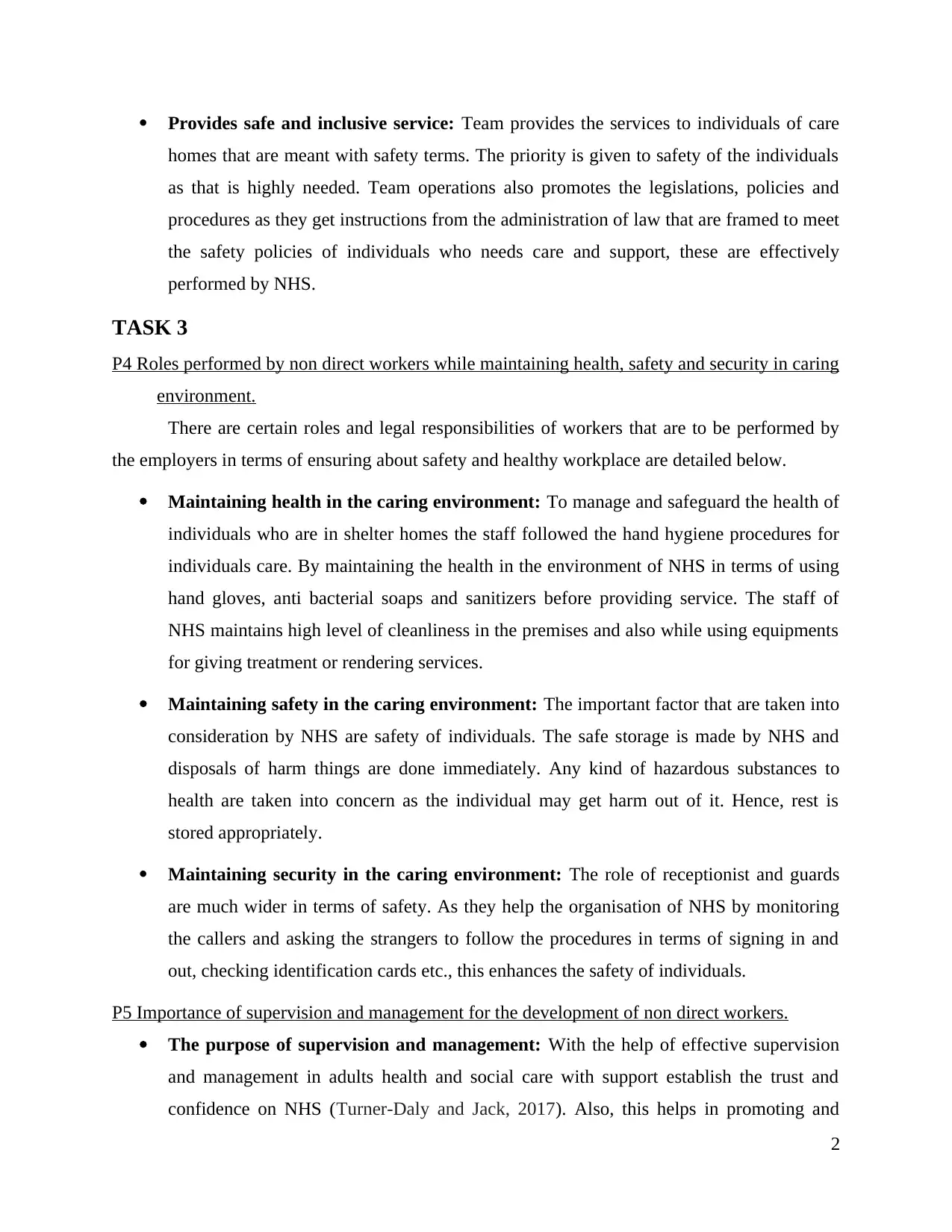
Provides safe and inclusive service: Team provides the services to individuals of care
homes that are meant with safety terms. The priority is given to safety of the individuals
as that is highly needed. Team operations also promotes the legislations, policies and
procedures as they get instructions from the administration of law that are framed to meet
the safety policies of individuals who needs care and support, these are effectively
performed by NHS.
TASK 3
P4 Roles performed by non direct workers while maintaining health, safety and security in caring
environment.
There are certain roles and legal responsibilities of workers that are to be performed by
the employers in terms of ensuring about safety and healthy workplace are detailed below.
Maintaining health in the caring environment: To manage and safeguard the health of
individuals who are in shelter homes the staff followed the hand hygiene procedures for
individuals care. By maintaining the health in the environment of NHS in terms of using
hand gloves, anti bacterial soaps and sanitizers before providing service. The staff of
NHS maintains high level of cleanliness in the premises and also while using equipments
for giving treatment or rendering services.
Maintaining safety in the caring environment: The important factor that are taken into
consideration by NHS are safety of individuals. The safe storage is made by NHS and
disposals of harm things are done immediately. Any kind of hazardous substances to
health are taken into concern as the individual may get harm out of it. Hence, rest is
stored appropriately.
Maintaining security in the caring environment: The role of receptionist and guards
are much wider in terms of safety. As they help the organisation of NHS by monitoring
the callers and asking the strangers to follow the procedures in terms of signing in and
out, checking identification cards etc., this enhances the safety of individuals.
P5 Importance of supervision and management for the development of non direct workers.
The purpose of supervision and management: With the help of effective supervision
and management in adults health and social care with support establish the trust and
confidence on NHS (Turner‐Daly and Jack, 2017). Also, this helps in promoting and
2
homes that are meant with safety terms. The priority is given to safety of the individuals
as that is highly needed. Team operations also promotes the legislations, policies and
procedures as they get instructions from the administration of law that are framed to meet
the safety policies of individuals who needs care and support, these are effectively
performed by NHS.
TASK 3
P4 Roles performed by non direct workers while maintaining health, safety and security in caring
environment.
There are certain roles and legal responsibilities of workers that are to be performed by
the employers in terms of ensuring about safety and healthy workplace are detailed below.
Maintaining health in the caring environment: To manage and safeguard the health of
individuals who are in shelter homes the staff followed the hand hygiene procedures for
individuals care. By maintaining the health in the environment of NHS in terms of using
hand gloves, anti bacterial soaps and sanitizers before providing service. The staff of
NHS maintains high level of cleanliness in the premises and also while using equipments
for giving treatment or rendering services.
Maintaining safety in the caring environment: The important factor that are taken into
consideration by NHS are safety of individuals. The safe storage is made by NHS and
disposals of harm things are done immediately. Any kind of hazardous substances to
health are taken into concern as the individual may get harm out of it. Hence, rest is
stored appropriately.
Maintaining security in the caring environment: The role of receptionist and guards
are much wider in terms of safety. As they help the organisation of NHS by monitoring
the callers and asking the strangers to follow the procedures in terms of signing in and
out, checking identification cards etc., this enhances the safety of individuals.
P5 Importance of supervision and management for the development of non direct workers.
The purpose of supervision and management: With the help of effective supervision
and management in adults health and social care with support establish the trust and
confidence on NHS (Turner‐Daly and Jack, 2017). Also, this helps in promoting and
2
Paraphrase This Document
Need a fresh take? Get an instant paraphrase of this document with our AI Paraphraser
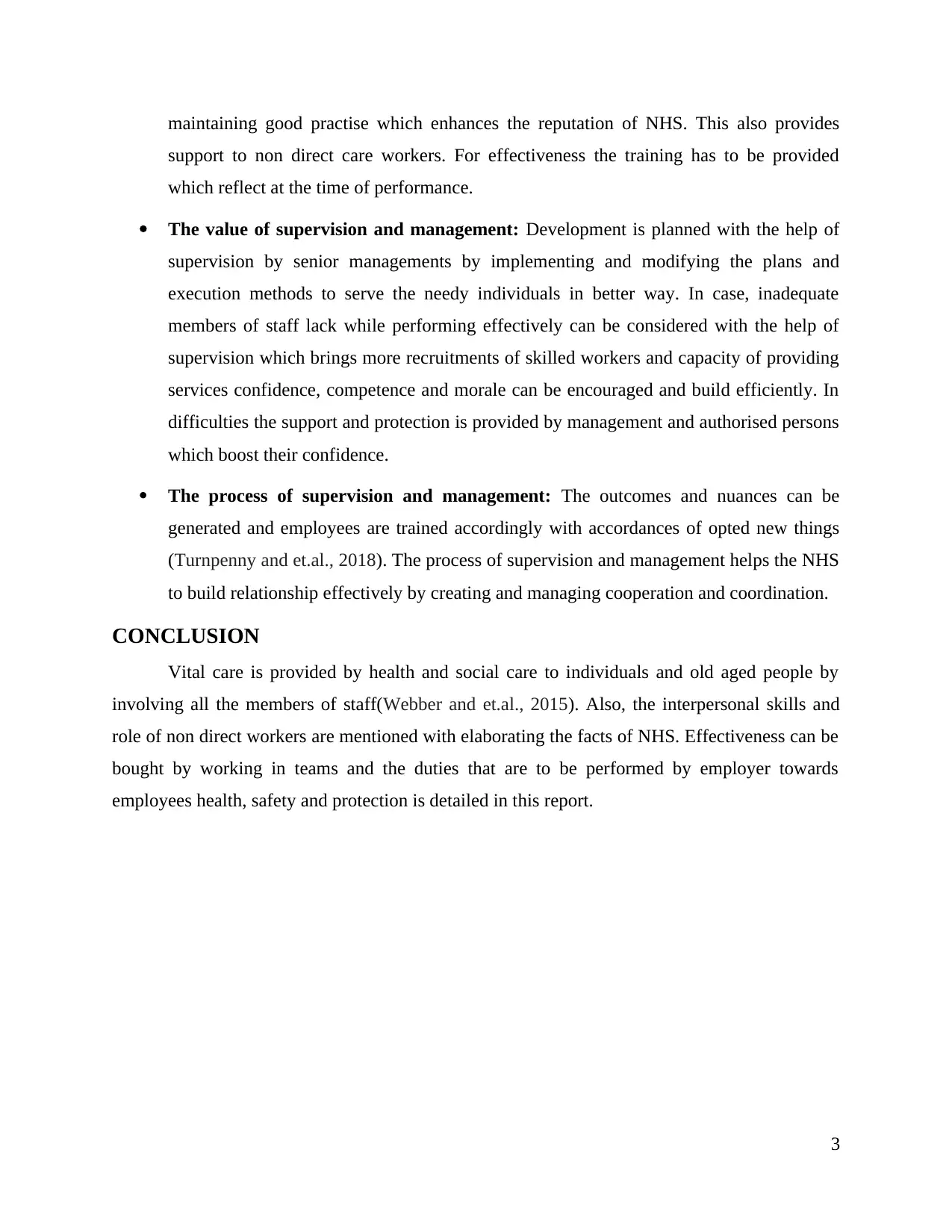
maintaining good practise which enhances the reputation of NHS. This also provides
support to non direct care workers. For effectiveness the training has to be provided
which reflect at the time of performance.
The value of supervision and management: Development is planned with the help of
supervision by senior managements by implementing and modifying the plans and
execution methods to serve the needy individuals in better way. In case, inadequate
members of staff lack while performing effectively can be considered with the help of
supervision which brings more recruitments of skilled workers and capacity of providing
services confidence, competence and morale can be encouraged and build efficiently. In
difficulties the support and protection is provided by management and authorised persons
which boost their confidence.
The process of supervision and management: The outcomes and nuances can be
generated and employees are trained accordingly with accordances of opted new things
(Turnpenny and et.al., 2018). The process of supervision and management helps the NHS
to build relationship effectively by creating and managing cooperation and coordination.
CONCLUSION
Vital care is provided by health and social care to individuals and old aged people by
involving all the members of staff(Webber and et.al., 2015). Also, the interpersonal skills and
role of non direct workers are mentioned with elaborating the facts of NHS. Effectiveness can be
bought by working in teams and the duties that are to be performed by employer towards
employees health, safety and protection is detailed in this report.
3
support to non direct care workers. For effectiveness the training has to be provided
which reflect at the time of performance.
The value of supervision and management: Development is planned with the help of
supervision by senior managements by implementing and modifying the plans and
execution methods to serve the needy individuals in better way. In case, inadequate
members of staff lack while performing effectively can be considered with the help of
supervision which brings more recruitments of skilled workers and capacity of providing
services confidence, competence and morale can be encouraged and build efficiently. In
difficulties the support and protection is provided by management and authorised persons
which boost their confidence.
The process of supervision and management: The outcomes and nuances can be
generated and employees are trained accordingly with accordances of opted new things
(Turnpenny and et.al., 2018). The process of supervision and management helps the NHS
to build relationship effectively by creating and managing cooperation and coordination.
CONCLUSION
Vital care is provided by health and social care to individuals and old aged people by
involving all the members of staff(Webber and et.al., 2015). Also, the interpersonal skills and
role of non direct workers are mentioned with elaborating the facts of NHS. Effectiveness can be
bought by working in teams and the duties that are to be performed by employer towards
employees health, safety and protection is detailed in this report.
3
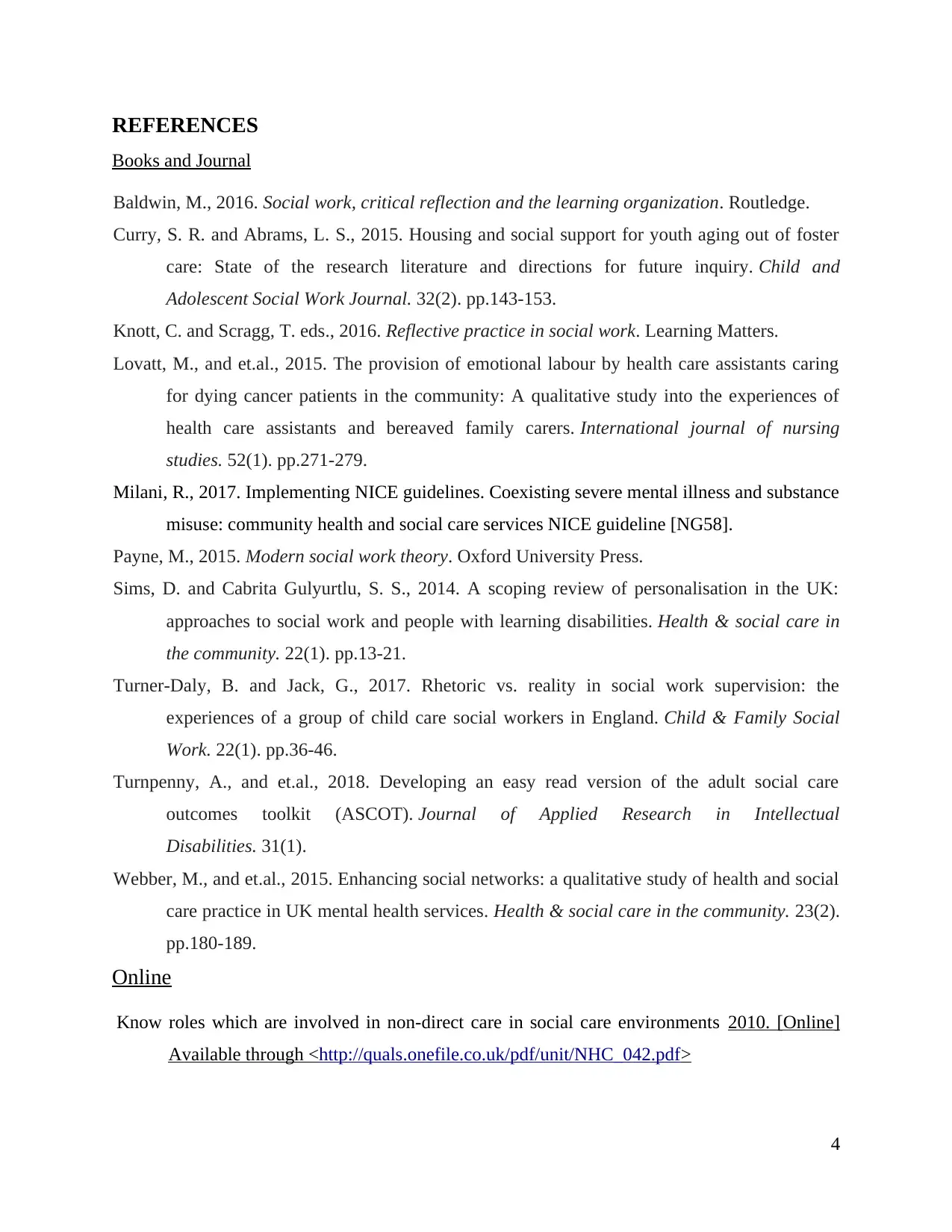
REFERENCES
Books and Journal
Baldwin, M., 2016. Social work, critical reflection and the learning organization. Routledge.
Curry, S. R. and Abrams, L. S., 2015. Housing and social support for youth aging out of foster
care: State of the research literature and directions for future inquiry. Child and
Adolescent Social Work Journal. 32(2). pp.143-153.
Knott, C. and Scragg, T. eds., 2016. Reflective practice in social work. Learning Matters.
Lovatt, M., and et.al., 2015. The provision of emotional labour by health care assistants caring
for dying cancer patients in the community: A qualitative study into the experiences of
health care assistants and bereaved family carers. International journal of nursing
studies. 52(1). pp.271-279.
Milani, R., 2017. Implementing NICE guidelines. Coexisting severe mental illness and substance
misuse: community health and social care services NICE guideline [NG58].
Payne, M., 2015. Modern social work theory. Oxford University Press.
Sims, D. and Cabrita Gulyurtlu, S. S., 2014. A scoping review of personalisation in the UK:
approaches to social work and people with learning disabilities. Health & social care in
the community. 22(1). pp.13-21.
Turner‐Daly, B. and Jack, G., 2017. Rhetoric vs. reality in social work supervision: the
experiences of a group of child care social workers in England. Child & Family Social
Work. 22(1). pp.36-46.
Turnpenny, A., and et.al., 2018. Developing an easy read version of the adult social care
outcomes toolkit (ASCOT). Journal of Applied Research in Intellectual
Disabilities. 31(1).
Webber, M., and et.al., 2015. Enhancing social networks: a qualitative study of health and social
care practice in UK mental health services. Health & social care in the community. 23(2).
pp.180-189.
Online
Know roles which are involved in non-direct care in social care environments 2010. [Online]
Available through <http://quals.onefile.co.uk/pdf/unit/NHC_042.pdf>
4
Books and Journal
Baldwin, M., 2016. Social work, critical reflection and the learning organization. Routledge.
Curry, S. R. and Abrams, L. S., 2015. Housing and social support for youth aging out of foster
care: State of the research literature and directions for future inquiry. Child and
Adolescent Social Work Journal. 32(2). pp.143-153.
Knott, C. and Scragg, T. eds., 2016. Reflective practice in social work. Learning Matters.
Lovatt, M., and et.al., 2015. The provision of emotional labour by health care assistants caring
for dying cancer patients in the community: A qualitative study into the experiences of
health care assistants and bereaved family carers. International journal of nursing
studies. 52(1). pp.271-279.
Milani, R., 2017. Implementing NICE guidelines. Coexisting severe mental illness and substance
misuse: community health and social care services NICE guideline [NG58].
Payne, M., 2015. Modern social work theory. Oxford University Press.
Sims, D. and Cabrita Gulyurtlu, S. S., 2014. A scoping review of personalisation in the UK:
approaches to social work and people with learning disabilities. Health & social care in
the community. 22(1). pp.13-21.
Turner‐Daly, B. and Jack, G., 2017. Rhetoric vs. reality in social work supervision: the
experiences of a group of child care social workers in England. Child & Family Social
Work. 22(1). pp.36-46.
Turnpenny, A., and et.al., 2018. Developing an easy read version of the adult social care
outcomes toolkit (ASCOT). Journal of Applied Research in Intellectual
Disabilities. 31(1).
Webber, M., and et.al., 2015. Enhancing social networks: a qualitative study of health and social
care practice in UK mental health services. Health & social care in the community. 23(2).
pp.180-189.
Online
Know roles which are involved in non-direct care in social care environments 2010. [Online]
Available through <http://quals.onefile.co.uk/pdf/unit/NHC_042.pdf>
4
⊘ This is a preview!⊘
Do you want full access?
Subscribe today to unlock all pages.

Trusted by 1+ million students worldwide
1 out of 6
Related Documents
Your All-in-One AI-Powered Toolkit for Academic Success.
+13062052269
info@desklib.com
Available 24*7 on WhatsApp / Email
![[object Object]](/_next/static/media/star-bottom.7253800d.svg)
Unlock your academic potential
Copyright © 2020–2026 A2Z Services. All Rights Reserved. Developed and managed by ZUCOL.





